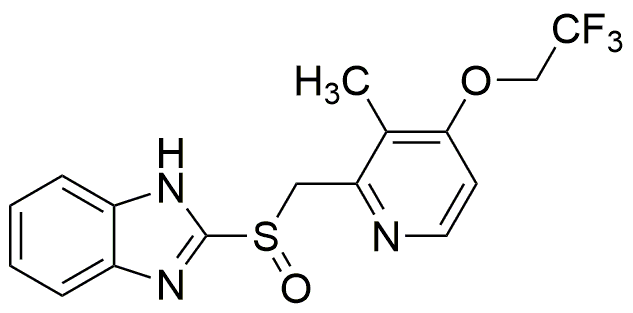Lansoprazole is widely utilized in research focused on:
- Gastrointestinal Health: Commonly used to treat conditions like gastroesophageal reflux disease (GERD) and peptic ulcers, providing relief by reducing stomach acid production.
- Pharmaceutical Development: Employed in the formulation of various medications, allowing for the creation of effective therapies with fewer side effects compared to older acid-reducing agents.
- Clinical Research: Frequently studied in clinical trials to evaluate its efficacy and safety, helping to advance understanding of acid-related disorders and improve treatment protocols.
- Combination Therapies: Often used in conjunction with antibiotics to treat H. pylori infections, enhancing the effectiveness of eradication regimens.
- Veterinary Medicine: Applied in veterinary practices for managing similar gastrointestinal issues in animals, showcasing its versatility across species.
Informations générales
Propriétés
Sécurité et réglementation
Applications
Lansoprazole is widely utilized in research focused on:
- Gastrointestinal Health: Commonly used to treat conditions like gastroesophageal reflux disease (GERD) and peptic ulcers, providing relief by reducing stomach acid production.
- Pharmaceutical Development: Employed in the formulation of various medications, allowing for the creation of effective therapies with fewer side effects compared to older acid-reducing agents.
- Clinical Research: Frequently studied in clinical trials to evaluate its efficacy and safety, helping to advance understanding of acid-related disorders and improve treatment protocols.
- Combination Therapies: Often used in conjunction with antibiotics to treat H. pylori infections, enhancing the effectiveness of eradication regimens.
- Veterinary Medicine: Applied in veterinary practices for managing similar gastrointestinal issues in animals, showcasing its versatility across species.
Documents
Fiches de données de sécurité (FDS)
La FDS fournit des informations de sécurité complètes sur la manipulation, le stockage et l’élimination du produit.
Spécifications du produit (PS)
Le PS fournit une description complète des propriétés du produit, notamment sa composition chimique, son état physique, sa pureté et les exigences de stockage. Il détaille également les plages de qualité acceptables et les applications prévues du produit.
Certificats d'analyse (COA)
Recherchez des certificats d'analyse (COA) en saisissant le numéro de lot du produit. Les numéros de lot et de lot se trouvent sur l'étiquette d'un produit, après les mots « Lot » ou « Lot de fabrication ».
Numéro de catalogue
Numéro de lot/série
Certificats d'origine (COO)
Ce certificat d'exploitation confirme le pays dans lequel le produit a été fabriqué, et détaille également les matériaux et composants utilisés et s'il est issu de sources naturelles, synthétiques ou autres sources spécifiques. Ce certificat peut être requis pour les douanes, le commerce et la conformité réglementaire.
Numéro de catalogue
Numéro de lot/série
Fiches de données de sécurité (FDS)
La FDS fournit des informations de sécurité complètes sur la manipulation, le stockage et l’élimination du produit.
DownloadSpécifications du produit (PS)
Le PS fournit une description complète des propriétés du produit, notamment sa composition chimique, son état physique, sa pureté et les exigences de stockage. Il détaille également les plages de qualité acceptables et les applications prévues du produit.
DownloadCertificats d'analyse (COA)
Recherchez des certificats d'analyse (COA) en saisissant le numéro de lot du produit. Les numéros de lot et de lot se trouvent sur l'étiquette d'un produit, après les mots « Lot » ou « Lot de fabrication ».
Numéro de catalogue
Numéro de lot/série
Certificats d'origine (COO)
Ce certificat d'exploitation confirme le pays dans lequel le produit a été fabriqué, et détaille également les matériaux et composants utilisés et s'il est issu de sources naturelles, synthétiques ou autres sources spécifiques. Ce certificat peut être requis pour les douanes, le commerce et la conformité réglementaire.


